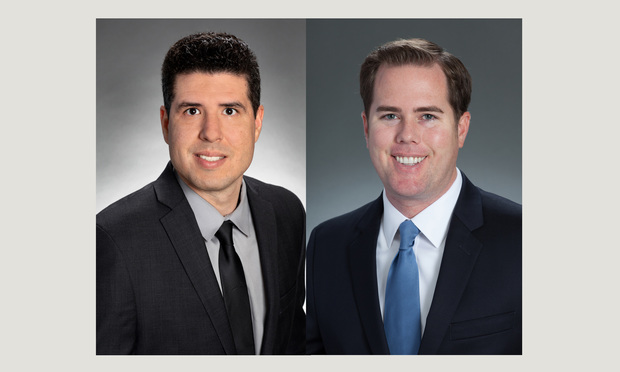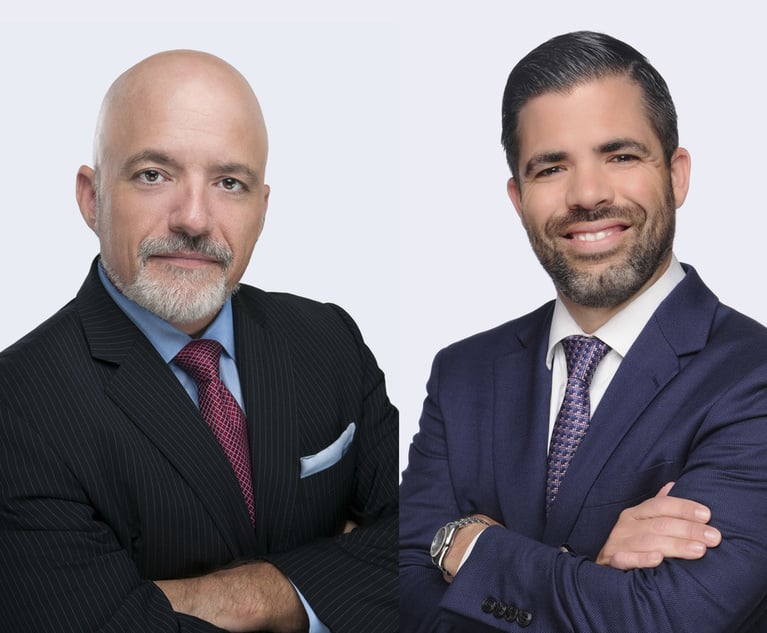Employer Obligations During Closings and Layoffs: Don't Forget the WARN Act
The WARN Act stands for Workers Adjustment and Retraining Notification Act, and is a federal law that requires covered employers to provide employees with a 60-day advanced notice of the layoffs. The failure of an employer to provide the required notice can open it up to a federal lawsuit by employees.
March 27, 2020 at 09:30 AM
4 minute read
 Daniel Eric Gonzalez, left, and Andrew M. Gordon, right, of Hinshaw & Culbertson.
Daniel Eric Gonzalez, left, and Andrew M. Gordon, right, of Hinshaw & Culbertson.
When an employer is closing a plant or engaging in a mass layoff, it is important for it to keep its WARN Act obligations in mind. Lately, supermarket chains in Florida, including Lucky's Market, Earth Fare and Penn Dutch Food Centers, have learned that lesson the hard way after each has been sued in class actions for failing to comply with the WARN Act. The WARN Act stands for Workers Adjustment and Retraining Notification Act, and is a federal law that requires covered employers to provide employees with a 60-day advanced notice of the layoffs. The failure of an employer to provide the required notice can open it up to a federal lawsuit by employees.
Lucky's and Earth Fare were each sued in February under the WARN Act. In the case of Lucky's, Lucky's opened its first store in Florida in 2016 and had a store locally in Fort Lauderdale. Lucky's opened a total of eight stores in Florida. However, due to the divestment of national retailer Kroger in late 2019, Lucky's announced the closure of all of its Florida stores, as well as 32 stores across the country. The problem is that Lucky's announced the closure of the stores on Jan. 24, with an expected layoff date of Feb. 12. This was not sufficient advanced notice to employees of the store closures. As a result of Lucky's failure to comply with the notice requirements under the WARN Act, Lucky's was sued in a class action in the U.S. District Court for the Middle District of Florida. The plaintiffs in the lawsuit are seeking the wages that they would have earned had they been provided with the full 60-day notice of the layoffs.
North Carolina-based Earth Fare had opened 50 locations nationwide, with 14 locations in Florida. Earth Fare closed all of its locations in February. According to the complaint filed against Earth Fare, Earth Fare informed employees on Feb. 3 that they were laid off effective immediately. Earth Fare never provided any prior notice to its employees. This resulted in employees filing a class action lawsuit against Earth Fare in the U.S. Bankruptcy Court of Delaware.
Additionally, last September, local South Florida supermarket Penn Dutch Food Centers was also hit with a class action lawsuit under the WARN Act. The employees claimed that Penn Dutch closed its stores without providing any prior notice to employees.
These cases show how important it is for employers who are closing down a location to keep their WARN Act obligations in mind. The WARN Act covers employers who employ at least 100 full-time employees or at least 100 employees who work a combined 4,000 hours per week. The WARN Act has an expansive definition of full-time employee as including any employee who works at least 20 hours per week. It is also important to keep in mind that the WARN Act does not apply to every layoff. It only applies to "plant" closings and mass layoffs. A "plant closing" is the closing of an employment site that results in the layoff of at least 50 full-time employees during a 30-day period. A "plant" can include a company store, a warehouse or any company location. The WARN Act also applies to mass layoffs that do not involve a plant closing if the mass layoff results in the termination of at least 500 full-time employees or 50 full-time employees if it includes at least 33% of the employer's total work force. If a covered employer engages in a plant closing or mass layoff, the employer is required to provide employees with 60 days advanced notice of the layoff.
Typically, it is easy to forget about the WARN Act because employers are often concerned with other matters associated with the plant closing or mass layoff. However, employers should keep their WARN Act obligations in mind to avoid risking a lawsuit.
Daniel Eric Gonzalez is a labor and employment law associate in the Fort Lauderdale office of Hinshaw & Culbertson. His clients include international corporations and small and midsize employers. Contact him at [email protected].
Andrew M. Gordon, a partner with the firm, is a litigator who focuses his practice in the representation of management-side labor and employment matters such as defending employers against state and federal discrimination, sex harassment, wage and hour, and retaliation claims, as well as FLSA collective actions, DOL compliance audits, whistleblower claims, and litigating non-compete/trade secret issues. Contact him at [email protected].
This content has been archived. It is available through our partners, LexisNexis® and Bloomberg Law.
To view this content, please continue to their sites.
Not a Lexis Subscriber?
Subscribe Now
Not a Bloomberg Law Subscriber?
Subscribe Now
NOT FOR REPRINT
© 2025 ALM Global, LLC, All Rights Reserved. Request academic re-use from www.copyright.com. All other uses, submit a request to [email protected]. For more information visit Asset & Logo Licensing.
You Might Like
View All
Trending Issues in Florida Construction Law That Attorneys Need to Be Aware Of
6 minute read


Law Firms Mentioned
Trending Stories
Who Got The Work
J. Brugh Lower of Gibbons has entered an appearance for industrial equipment supplier Devco Corporation in a pending trademark infringement lawsuit. The suit, accusing the defendant of selling knock-off Graco products, was filed Dec. 18 in New Jersey District Court by Rivkin Radler on behalf of Graco Inc. and Graco Minnesota. The case, assigned to U.S. District Judge Zahid N. Quraishi, is 3:24-cv-11294, Graco Inc. et al v. Devco Corporation.
Who Got The Work
Rebecca Maller-Stein and Kent A. Yalowitz of Arnold & Porter Kaye Scholer have entered their appearances for Hanaco Venture Capital and its executives, Lior Prosor and David Frankel, in a pending securities lawsuit. The action, filed on Dec. 24 in New York Southern District Court by Zell, Aron & Co. on behalf of Goldeneye Advisors, accuses the defendants of negligently and fraudulently managing the plaintiff's $1 million investment. The case, assigned to U.S. District Judge Vernon S. Broderick, is 1:24-cv-09918, Goldeneye Advisors, LLC v. Hanaco Venture Capital, Ltd. et al.
Who Got The Work
Attorneys from A&O Shearman has stepped in as defense counsel for Toronto-Dominion Bank and other defendants in a pending securities class action. The suit, filed Dec. 11 in New York Southern District Court by Bleichmar Fonti & Auld, accuses the defendants of concealing the bank's 'pervasive' deficiencies in regards to its compliance with the Bank Secrecy Act and the quality of its anti-money laundering controls. The case, assigned to U.S. District Judge Arun Subramanian, is 1:24-cv-09445, Gonzalez v. The Toronto-Dominion Bank et al.
Who Got The Work
Crown Castle International, a Pennsylvania company providing shared communications infrastructure, has turned to Luke D. Wolf of Gordon Rees Scully Mansukhani to fend off a pending breach-of-contract lawsuit. The court action, filed Nov. 25 in Michigan Eastern District Court by Hooper Hathaway PC on behalf of The Town Residences LLC, accuses Crown Castle of failing to transfer approximately $30,000 in utility payments from T-Mobile in breach of a roof-top lease and assignment agreement. The case, assigned to U.S. District Judge Susan K. Declercq, is 2:24-cv-13131, The Town Residences LLC v. T-Mobile US, Inc. et al.
Who Got The Work
Wilfred P. Coronato and Daniel M. Schwartz of McCarter & English have stepped in as defense counsel to Electrolux Home Products Inc. in a pending product liability lawsuit. The court action, filed Nov. 26 in New York Eastern District Court by Poulos Lopiccolo PC and Nagel Rice LLP on behalf of David Stern, alleges that the defendant's refrigerators’ drawers and shelving repeatedly break and fall apart within months after purchase. The case, assigned to U.S. District Judge Joan M. Azrack, is 2:24-cv-08204, Stern v. Electrolux Home Products, Inc.
Featured Firms
Law Offices of Gary Martin Hays & Associates, P.C.
(470) 294-1674
Law Offices of Mark E. Salomone
(857) 444-6468
Smith & Hassler
(713) 739-1250






